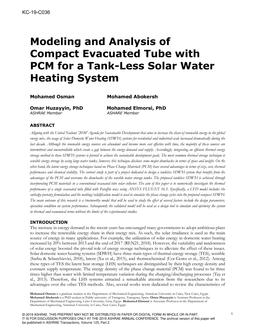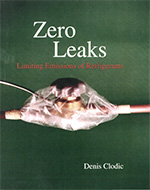The cooling system/building coupling encounters several modeling difficulties. First, the lack of manufacturers’ data for cooling equipment (manufacturers are often not very keen on giving this information) prevent the development of an accurate model. Secondly, building simulation codes often give good results for the estimation of the loads but not for the estimation of the system consumption, mainly because the system is only characterized by its performance at nominal steady-state conditions. Finally, the on/off cycling of the system is not taken into account because the time step of most simulation codes is one hour.
The purpose of this paper is to present a nondimensional model of single-speed split systems, integrating both transient and steady-state aspects. As for the steady-state behavior, a mathematical model has been developed using manufacturers’ data for a wide range of split-system heat pumps based on only three parameters. The modeling of he dynamic state requires the knowledge of four more parameters. A method of coupling the cooling system model with a simulation code for dynamic regimes is proposed as well. The coupling of he model with any thermal and airflow building simulation code allows one to calculate, with an hourly time step, the operating time and the cycling time for the system, the total and sensible capacities, the electric power, as well as the evolution of the humidity in the air-conditioned zone.
The initial simulation results and comparisons with measurements in a test cell have shown that the model is capable of predicting the sensible capacity and he electric power with good accuracy. However,discrepancies were observed for the total cooling capacity modeling mainly because the humidity in the test cell was not properly taken into account.
Units: Dual
Citation: Symposium, ASHRAE Transactions, vol. 108, pt. 2
Product Details
- Published:
- 2002
- Number of Pages:
- 16
- File Size:
- 1 file , 780 KB
- Product Code(s):
- D-8872


